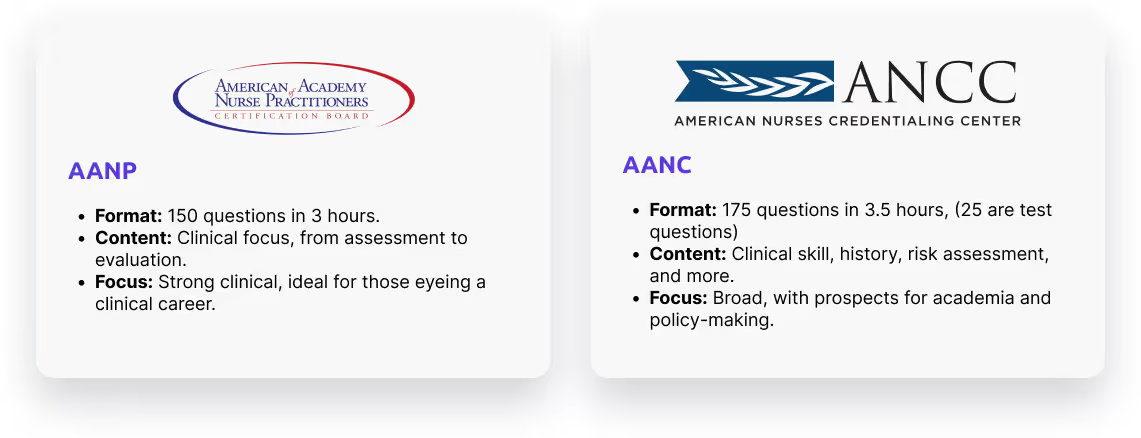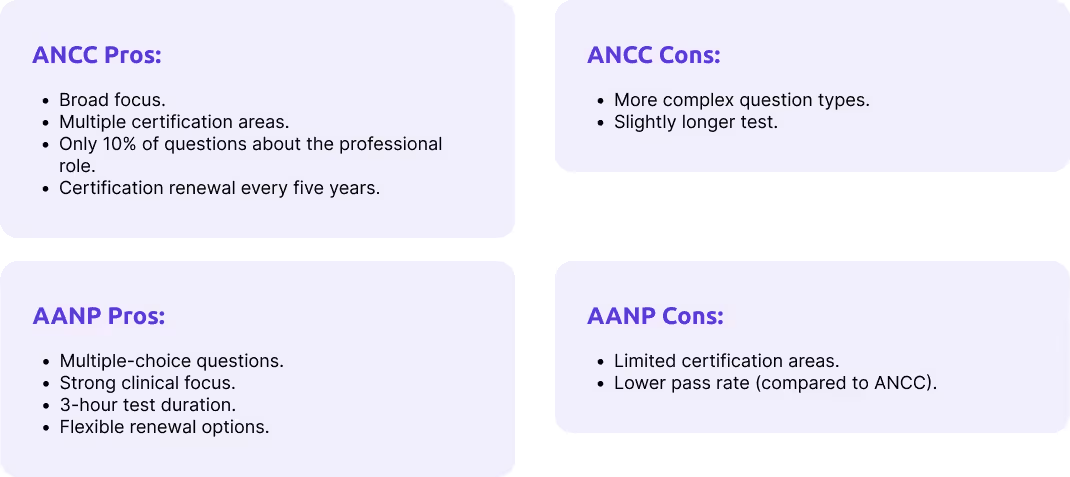TL;DR: AANP vs. ANCC Certification 2025: Which One Should You Take?
- AANP = Clinical Focus, ANCC = Academic Breadth. AANP is ideal for hands-on clinicians prioritizing direct patient care, while the American Nurses Credentialing Center suits those eyeing research, policy, or academic roles.
- Exam Format Differences. The AANP exam features straightforward multiple choice questions; ANCC certification exams include complex question types like drag and drop and hotspots.
- Choose Based on Career Goals. Want to specialize or go administrative? ANCC has more nurse practitioner certifications. Purely focused on clinical practice? AANP certification might be your perfect match.
- State and Employer Preferences Matter. Most accept both the ANCC and AANP certifications, but always double-check your state board or job requirements.
- Both Require Renewal Every 5 Years. Stay sharp with CE credits—no need to retake the full certification exam unless you let it lapse.
As you approach graduation from your nurse practitioner program in 2025, you're likely grappling with an important decision: which board certification exam should you take—AANP or ANCC?
The American Academy of Nurse Practitioners Certification Board (AANPCB) and the American Nurses Credentialing Center (ANCC) both offer challenging and well-regarded NP certification exams. However, they are tailored to different professional goals and offer distinct advantages for your nursing career.
Understanding these differences is crucial for making an informed choice that aligns with your career aspirations and affects your future job prospects. Whether you're pursuing family nurse practitioner certification or another specialty, this guide delves into the specifics of both AANP and ANCC certifications, providing you with the insights needed to make the right decision for your professional development.
If you're already confident about your certification path and are looking ahead to your nursing career, exploring current nurse practitioner positions can help you understand which opportunities align with your chosen certification and career goals.
ANCC vs AANP: A Brief Overview of Certification
Before diving into the specifics, it's important to note that every nurse practitioner must be licensed to practice. However, not all states require board certification. Despite this, the benefits of becoming a certified nurse practitioner extend far beyond mere legal requirements—they significantly impact your professional practice and career opportunities.
Both the AANP and ANCC exams are designed to verify an NP's knowledge and skill set across core competencies essential for safe, effective patient care. The American Nurses Credentialing Center (ANCC) exam is generally more research-oriented and emphasizes nursing theory, while the AANP certification focuses more heavily on clinical practice and direct patient care scenarios. Understanding these differences can help you decide which certification body and exam approach best aligns with your career goals.
Exam Similarities & Differences
While both the AANP and ANCC certification exams are highly respected within the nursing profession, they differ significantly in format, content emphasis, and focus areas. These board certification exams offered by both certification bodies are crucial components for nurse practitioners seeking appropriate certification in various specialties, from family nurse practitioner to psychiatric mental health nurse practitioner roles.
- AANP Exam: The AANPCB exam is known for its strong clinical focus and emphasis on real-world application. Key characteristics include:
- Clinical emphasis: Tests core competencies like patient assessment process, diagnosis, planning, and evaluation that directly translate to clinical practice.
- Target audience: Ideal for nurse practitioners who prefer direct patient care settings like primary care or emergency medicine.
- Question format: Features only straightforward multiple choice questions for clarity and consistency.
- Exam structure: 150 total questions (135 scored, 15 pretest) completed within three hours
- Test taker feedback: Appreciated for its clinical relevance and straightforward approach
- ANCC Exam: In contrast, the ANCC certification exam is broader in scope and integrates more theoretical foundations. The American Nurses Credentialing Center approach includes:
- Comprehensive coverage: Addresses nursing theory, ethical practices, legal principles, and research methodology alongside clinical practice scenarios.
- Diverse question types: Multiple choice questions, multiple-response items, drag and drop exercises, and hotspot questions that test different cognitive skills.
- Extended format: 175 total questions (150 scored, 25 pretest) with a 3.5-hour duration reflecting extensive content coverage.
Professional development focus: Emphasizes broader nursing practice foundations beyond direct patient care.

The Pros and Cons of Each Certification
Choosing between the AANP vs ANCC exams involves weighing the pros and cons of each certification body based on your career goals and personal preferences. Here's what you need to know about each option:
American Nurses Credentialing Center (ANCC) Certification:
Pros:
- Broad Focus: The ANCC exam, administered by the American Nurses Credentialing Center (ANCC), covers a wide range of topics, making it ideal for NPs interested in academic, administrative, or policy roles.
- Multiple Certification Areas: The ANCC offers certifications in various specialties, giving you the flexibility to pursue different career paths.
- Professional Role Content: Only 10% of the exam questions focus on the professional role, allowing for a more comprehensive assessment of your knowledge. The ANCC places a strong emphasis on professional practice, assessing competence in areas such as ethics, legal principles, and the overall framework of nursing practice.
- Renewal: Certification is renewed every five years, ensuring that your skills and knowledge remain up-to-date.
Cons:
- Complex Question Types: The ANCC exam includes a variety of question types, some of which can be more challenging to navigate.
- Longer Exam: The exam duration is slightly longer compared to the AANP exam, which may require more stamina and preparation.
AANP Exam Certification:
Pros:
- Clinical Focus: With a strong emphasis on clinical practice, the AANP exam is ideal for those who prefer direct patient care and want to focus on clinical roles as a certified nurse practitioner.
- Multiple-Choice Format: The exam consists entirely of multiple-choice questions, which some candidates may find less intimidating than the varied question types in the ANCC exam.
- The American Academy of Nurse Practitioners Certification Board (AANPCB) is a key organization that offers various nurse practitioner certifications, including Family Nurse Practitioner and Adult-Gerontology Primary Care Nurse Practitioner.
- Shorter Duration: The AANP exam is three hours long, making it slightly shorter than the ANCC exam.
- Flexible Renewal Options: The AANP offers several renewal options, allowing you to choose the method that best suits your career trajectory.
Cons:
- Limited Certification Areas: The AANP offers fewer specialty certifications compared to the ANCC, which might be a limitation if you’re interested in a more specialized area of practice.
- Lower Pass Rate: Historically, the AANP exam has had a slightly lower pass rate compared to the ANCC exam, which might reflect its clinical rigor.

Making the Decision: What Factors Should Influence Your Choice?
Your decision between the ANCC vs AANP certifications should be guided by your career aspirations, preferred work environment, and the areas of nursing practice you're passionate about. Here are key factors to consider when choosing the appropriate certification for your professional journey:
- Career Goals and Professional Development: If you're aiming for a career in academia, research, or healthcare policy, the ANCC exam's broader theoretical foundation and comprehensive coverage may better align with your aspirations. Conversely, suppose your goal is to work in clinical practice with a focus on direct patient care in primary care or family medicine settings. In that case, the AANP certification's clinical orientation and emphasis on core competencies may be more suitable.
- Specialty Focus and Certification Requirements: Consider which certification body offers credentials in your desired specialty area. The American Nurses Credentialing Center provides certifications for adult gerontology acute care, psychiatric mental health nurse practitioner roles, and other specialized areas, while the AANPCB exam focuses primarily on family nurse practitioner, adult-gerontology primary care nurse practitioner, and emergency nurse practitioner certifications.
- Learning Style and Testing Preferences: Evaluate your comfort level with different question formats. If you perform better with straightforward multiple choice questions and prefer a streamlined approach, the AANP exam structure may align with your testing strengths. However, if you're comfortable with varied question types, including drag-and-drop exercises and multiple-response items, the ANCC certification exams could be a better fit.
- Geographic and Employment Considerations: Although most states and employers accept both the AANP and ANCC certifications equally, it's crucial to verify specific requirements in your intended practice location. Some healthcare systems or specialty practices may express preferences for certain certification bodies, which could influence your nursing career trajectory.
- Financial and Time Investment: Consider exam costs, preparation time, and renewal requirements. The AANP exam typically costs less and has a shorter duration, while ANCC certification exams require a higher investment but offer more flexible professional development pathways for maintaining your board certified status.
The Importance of Board Certification Exams
Regardless of whether your state mandates certification, passing board certification exams represents a pivotal milestone in your nurse practitioner journey. Board certification transcends mere regulatory compliance—it demonstrates your clinical competence, professional expertise, and unwavering commitment to delivering exceptional patient care across diverse healthcare settings.
Understanding the nuances between the AANP vs ANCC certification exams is particularly crucial for aspiring nurse practitioners, whether you're pursuing family nurse practitioner certification, adult gerontology specialization, or other advanced practice roles. This knowledge empowers you to select the most appropriate certification path and develop targeted test prep strategies that align with your chosen exam's format and content emphasis.
The benefits of earning your board certified credentials extend far beyond initial licensure. Many healthcare employers actively seek certified nurse practitioners, viewing certification as a marker of professional excellence and clinical readiness. This preference can significantly enhance your competitiveness in the job market, opening doors to premium positions, leadership opportunities, and specialized roles that may not be available to non-certified practitioners.
As you prepare for this important step in your professional practice, consider exploring current market trends and opportunities. Understanding how different certifications are valued across various healthcare settings can provide valuable insights into your career planning and development. Browse available nurse practitioner jobs to see how certification requirements vary across specialties and regions, helping you make an informed decision that aligns with both your certification choice and long-term career objectives.
Conclusion
Choosing between AANP and ANCC certifications is a defining moment in your nursing career journey. Both certification exams are equally respected and lead to the same goal: becoming a competent, board certified nurse practitioner ready to deliver exceptional patient care.
Your decision should reflect your unique path:
- Clinical-focused practitioners drawn to direct patient care will find the AANP's straightforward approach and clinical emphasis aligns with primary care and emergency medicine goals
- Research and policy-minded professionals may prefer ANCC's comprehensive scope, which prepares you for academic roles, administrative positions, and specialized areas like psychiatric mental health or adult gerontology
- Career flexibility seekers should consider ANCC's broader certification options, while those prioritizing cost and testing simplicity may lean toward AANP
Neither choice is wrong—both validate your core competencies and open doors to rewarding opportunities in nursing practice. Your certification marks the beginning of a lifelong commitment to professional development and patient advocacy.
As you advance in your career, remember the challenges you've faced finding clinical placements and quality mentorship. When you're ready to give back, consider becoming a preceptor to help guide future nurse practitioners through their own certification journey.
FAQs on ANCC vs AANP Certification
Why is the AANP certification exam considered more clinical than the ANCC?
The AANP exam focuses heavily on practical clinical knowledge, testing candidates on areas such as assessment, diagnosis, planning, and evaluation. This gives it a strong clinical orientation compared to the broader, research-oriented ANCC exam. Additionally, the AANP's fnp certification exam emphasizes clinical competencies essential for family nurse practitioners.
Which exam should I take if I aim for an academic career?
NPs with aspirations in teaching, research, or policy typically gravitate toward the ANCC exam due to its comprehensive coverage of these areas, including nursing theory, ethics, and research. The ANCC exam is particularly suitable for those seeking a family nurse practitioner certification, which is highly regarded in academic settings.
Are the exams priced differently?
Yes, the AANP exam costs $315 for non-members, while the ANCC exam costs $395 for non-members. Membership in the respective organizations may offer discounted exam fees.
Can I switch certification bodies?
Certainly! If you’re certified by one organization but wish to specialize in an area not covered by them, you can pursue certification with the other. This flexibility allows you to expand your expertise and adapt to evolving career goals.
Is it mandatory to renew specialty nursing certifications?
Yes, both the ANCC and AANP certifications require renewal every five years. The renewal process typically involves fulfilling specific criteria, such as completing continuing education credits, to ensure that your knowledge and skills remain current. This is crucial for nurse practitioners to maintain their professional standards. But you don't have to retake either the ANCC exams or the AANP exams.
Find a preceptor who cares with NPHub
Book a rotation.webp)








.webp)


.webp)



%20(3)%20(2).svg)
.webp)